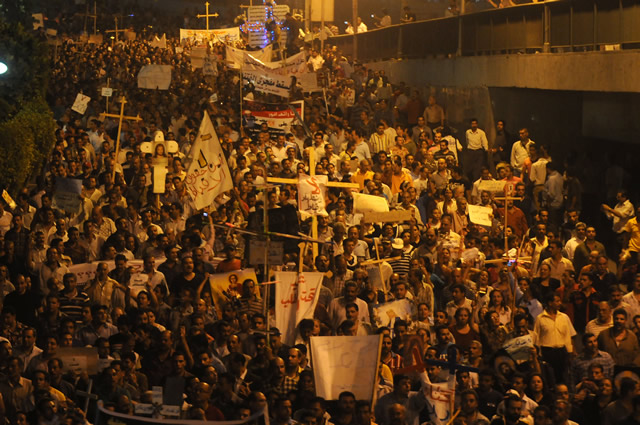Egypt: The Military’s Chaotic Approach to Democratic Transition
Morgan Lorraine Roach /
Nine months ago, Egyptians were protesting in Tahrir Square, calling for former president Hosni Mubarak to step down from office. Today, Egyptians are demanding that the country’s military, a once revered entity, return the country to civilian rule in next month’s parliamentary elections.

Thousands of Egyptian Coptic Christians march in Cairo during a protest against the attack on a church in southern Egypt in October 9, 2011. Clashes erupted with security forces after demonstrators started hurling stones and set fire to two cars, an AFP correspondent said. AFP PHOTO/MOHAMMED HOSSAM
Since Mubarak’s fall, the Supreme Council of the Armed Forces (SCAF), Egypt’s interim government, has mismanaged the country, stirred sectarian tensions, and used a ham-fisted approach when responding to demonstrations.
The army’s brutal response to last weekend’s protests by Coptic Christians was a wake-up call for Egyptians who fear that the November elections will be postponed.
On Sunday, several thousand members of the marginalized Coptic sect, which makes up 10 percent of the Egyptian population, organized a demonstration at the state’s television and radio station in Maspero. The protest was in response to the SCAF’s reluctance to prosecute radical Islamists who desecrated two churches in Upper Egypt. While it is unclear who initiated the violence, security forces launched a disproportionate attack, killing 26 and wounding hundreds.
The SCAF’s response to the deadly protest is not encouraging. As the protests took place, the state media, controlled by the interim government, called for “honest Egyptians” to take to the streets and protect the army against Christian assailants. Attempting to downplay the media’s blatant incitement of violence, Egypt’s minister of education, Osama Heikal, defended the announcers, saying that the statements were made “under emotional stress.” In an attempt to absolve himself and the SCAF of blame, Prime Minister Essam Sharaf stated that “hidden hands, domestic and foreign” were responsible for the unrest.
The SCAF’s provocation of sectarian tensions to defend itself against public frustration suggests malevolent intentions on behalf of army leaders. In addition to postponing presidential elections until the end of 2012, the SCAF has remained in office despite its promise to vacate after six months and has sought to keep the army’s budget exempt from parliamentary oversight. By creating insecurity, the army can justify an extended rule, arguing that conditions are too unstable to hold elections.
Once the guarantor of stability, the military has become a source of violence. Egyptians want a return to civilian government yet there are growing fears that the transition will be delayed. The SCAF must keep its promises and ensure that Egypt makes an unfettered transition to civilian rule.
Furthermore, the United States should discourage the SCAF from using disproportionate force against protestors, encourage it to investigate and prosecute those responsible for the increasing number of attacks on Egypt’s Christian minority, and urge a timely democratic transition.
